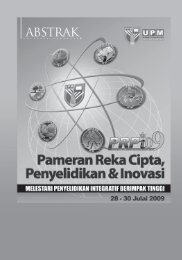BUKU ABSTRAK - Universiti Putra Malaysia
BUKU ABSTRAK - Universiti Putra Malaysia
BUKU ABSTRAK - Universiti Putra Malaysia
Create successful ePaper yourself
Turn your PDF publications into a flip-book with our unique Google optimized e-Paper software.
Agriculture<br />
Are Non-muslims Aware of the Principles of Halal Food Products in <strong>Malaysia</strong>?<br />
Dr. Golnaz Rezai<br />
Zainalabidin Mohamed, Mad Nasir Shamsudin and Eddie Chiew Fook Chong<br />
Faculty of Agriculture, University <strong>Putra</strong> <strong>Malaysia</strong>,<br />
43400 UPM Serdang, Selangor, <strong>Malaysia</strong>.<br />
+603-8946 4120; rgolnaz@putra.upm.edu.my<br />
Halal is an Arabic word meaning lawful or permitted and all foods consumed by Muslims must meet this<br />
Islamic dietary code. It also stands for just and fair business transactions, caring for animals and the environment,<br />
social justice and welfare. It is not limited to what the public mostly perceived, confined or restricted only to<br />
the slaughtering of animals for consumption by Muslims, but encompasses products and services of the highest<br />
quality to meet the ever increasing awareness and needs of consumers in a demanding global market. Although<br />
the Halal concept has not been a major element in the non-Muslim consumers living in an Islamic country,<br />
however, whether the non-Muslim consumers are aware of the underlying advantages that come with Halal food<br />
products or their viewpoint from its religious belief, are some intriguing questions that need to be answered. A<br />
survey was conducted in the Klang Valley Selangor where 400 non-Muslim respondents were interviewed via<br />
structured questionnaires to gather information on their awareness and attitude towards Halal food products in the<br />
<strong>Malaysia</strong>n food market. Descriptive statistic was used to identify the socio-economic/demographic characteristics<br />
and attitudes of the respondents toward the Halal food principles. The logit model was used to determine the<br />
extent to which selected socio-economic/demographic characteristics influenced the respondents’ attitude and<br />
understanding on Halal principles and Halal food products. The results of this study suggest that non-Muslim<br />
consumers are aware of the existence of Halal food and Halal logo on food products. In general, various socioeconomic/demographic<br />
and attitudinal characteristics significantly influenced the likelihood of respondents in<br />
understanding of Halal principles and concepts.<br />
Keywords: Halal food, demographic characteristics, halal principle, non-muslim consumers, logit model<br />
Production of Pisang Nangka (AAB) Disease Tolerant by Expressing the Rice<br />
Thaumatin-like Protein (TLP) Gene<br />
Prof. Dr. Maziah Mahmood<br />
Fatemeh Mahdavi Darvari, Sariah Moen and Mohd. Puad Abdullah<br />
Institute of Tropical Agriculture, University <strong>Putra</strong> <strong>Malaysia</strong>,<br />
43400 UPM Serdang, Selangor, <strong>Malaysia</strong>.<br />
+603-8946 6703; maziahm@biotech.upm.edu.my<br />
Banana is a staple food for millions of people in the tropical and subtropical parts of the world and their<br />
export contributes to the economies of many countries. But, in recent years, their production has been seriously<br />
threatened by diseases. Fusarium wilt, caused by Fusarium oxsiporum f.sp. cubense fungus, is one of the most<br />
important diseases of banana (Musa spp.). It is prevalent in all banana-growing countries, especially Southeast<br />
Asia and caused significant yield losses. Among four races of F. oxysporum f. sp. cubense, only three of them<br />
(Race 1, 2 and 4) affect banana and Race four the is most destructive. The wide spread presence of race 4 of the<br />
pathogen has been reported as a serious disease for most of the banana cultivars such as Pisang Nangka (AAB).<br />
In this research we transferred the rice thaumatin-like protein gene and evaluated the effect of its expression<br />
over Fusarium oxsiporum f.sp. cubense race 4 in Pisang Nangka which has a big market in <strong>Malaysia</strong>. The<br />
objective of the study was to produce a new tolerant cultivar of Pisang Nangka to Fusarium wilt which will be<br />
used for plantation scale. The obtained results confirmed by PCR, Southern blot and RT-PCR techniques showed<br />
the presence and expression of rice thaumatin-like protein gene in genomic DNA transformed plants. Besides,<br />
the transgenic plants showed significant resistance against Fusarium wilt after their inoculation with Fusarium<br />
oxsiporum f.sp. cubense race 4 spores suspension. We have, therefore, successfully produced a new tolerant<br />
cultivar of Pisang Nangka (AAB) and at the same time overcome the Fusarium wilt disease significantly.<br />
Keywords: Genetic engineering, pisang nangka, fusarium wilt, thaumatin-like protein<br />
14



